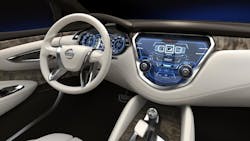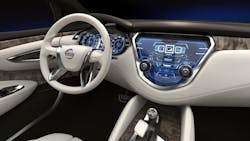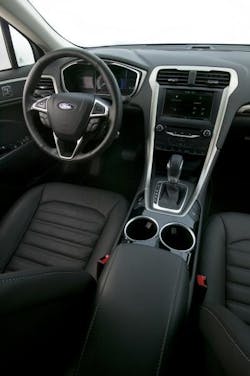Some “buzz kill” for in-vehicle technology desire?
That’s what Coleman’s 14,195 online interviews amongst adults in Brazil, China, France, Germany, Indonesia, Italy, Malaysia, South Africa, South Korea, Spain, Great Britain and the U.S. uncovered.
According to this poll, drivers in China, Brazil, Indonesia and Malaysia expressed the strongest interest in all of the connected vehicle technologies and digital services currently available, with Chinese drivers maintaining the highest current usage of such technology currently and desiring greater future use of it, followed by drivers in Brazil, Indonesia, Malaysia and South Africa.
By contrast, drivers in Great Britain and the U.S. say they aren’t hot-to-trot on in-vehicle systems:
- Drivers in Great Britain are the only drivers in Accenture’s survey who still see engine performance as more important than the car’s driving performance when buying a new car. They show the lowest level of interest in real-time entertainment services such as social media and gaming, as well as productivity services such as email and calendar access.
- Drivers in the U.S. reported the lowest interest in connected navigation services such as real-time traffic information and have very low interest in productivity services such as e-mail and calendar access.
Still, Accenture believes that the high interest displayed for “next-generation in-car technologies” among drivers China, Brazil, and elsewhere could help shape future demand for sales – to the point where those drivers said they are twice as likely to choose a car based on in-vehicle technology options than its performance.
“The high demand across the emerging world will no doubt speed the development and influence the rollout of next-generation products and services by the global auto industry,” added Luca Mentuccia, global managing director for Accenture’s automotive practice. “This is especially significant considering that nearly 40% of drivers surveyed indicated that in-car technology is the primary factor they consider in purchasing a new car.”
OK, so what did in-vehicle systems did drivers outside of Great Britain and the U.S. desire the most? Take a look:
- Brazilian drivers show a strong interest in the majority of connected vehicle services and also are the most influenced by technology, over engine performance, when it comes to making a vehicle purchase. They are the most likely group to pay for services using a monthly fee and they are most interested in giving full social media connectivity, a specific capability for reading and dictating emails and car-to-car communications to passengers.
- Drivers in China show the highest interest in twenty areas of connected vehicle technologies and digital services for drivers, more than any other country. In most cases Chinese drivers have the highest current usage of these technologies and services.
- Drivers in France would like passengers to have access to a driver fatigue warning device but show a very low interest in real-time social media and gaming infotainment services.
- When asked about payment choices for connected vehicle services, drivers in Germany have the biggest interest in a free basic service, paid for by advertising, compared to the other countries. They are the least likely to use real-time news, sport and weather information. They also have the lowest interest in a number of the technologies that allow for maintenance-related services.
- Indonesian drivers have the highest interest in real-time entertainment content such as social media and gaming, as well as productivity services such as email and calendar content. They are also very interested in using educational and e-learning services in the car and the most likely group to pay for connected vehicle services through a single purchase for a predefined period.
- Italian drivers would like to allow passengers to use a system that enables them to stop the vehicle if the diver is incapacitated or taken ill.
- Drivers in Malaysia have a strong interest in car parking space detection systems as well as fully automatic parking assist systems. In the event of an emergency, respondents said they wanted a system that stops the car and automatically sends out an emergency call.
- South African drivers have the highest interest in a range of safety features, including an automatic emergency call service for their vehicle when a crash takes place, lane changing warning systems, fatigue warning devices and collision warning technology. They are the current highest users of vehicle tracking services.
- South Korean drivers show some of the highest interest in using a range of the digital travel services such as live traffic information and local searches for points of interest. They are the highest current users of ‘black box’ services that monitor driving to reduce insurance premiums.
- When asked about general use of connected vehicle services, Spanish drivers are the most likely group to use them only for better driver experience and minimizing driver distraction. They have the highest interest in an automatic emergency call service for their vehicle and lane-keeping technology.
According to the firm, while only 13% of drivers surveyed said they currently use a vehicle health report and 12% use vehicle lifecycle management services, 39% and 37%, respectively, expect to start using these services soon.
Mentuccia believes that the ability to source data from vehicles will enable a range of new business-to-business and business-to-consumer digital services. For OEMs, detailed data from vehicles could help them improve their engineering processes, reduce warranty costs and improve their relationships with dealers by helping dealers manage parts inventory and service, he added.
Finally, while there is ongoing debate about the future and safety of driverless cars, Accenture’s research shows that, on average, 90% of all the survey respondents maintain an interest in some autonomous driving options, primarily those related to safety, with the most popular features including: lane-changing warning systems; collision-warning systems; lane-keeping systems; automatic braking systems that prevent hitting an object and fully automatic parking.
“However, as drivers increase their demand for next-generation connected vehicle technologies across navigation, infotainment, safety, autonomous driving and mobile device integration, vehicle manufacturers face a challenge in being able to meet the complex integration requirements of a broad array of technologies in each range of vehicles,” cautioned Mentuccia.
Something to think about as the development of “connected vehicles” shows no signs of slowing any time soon – even if drivers in Great Britain and the U.S. don’t seem too thrilled with the capabilities such vehicles offer.


